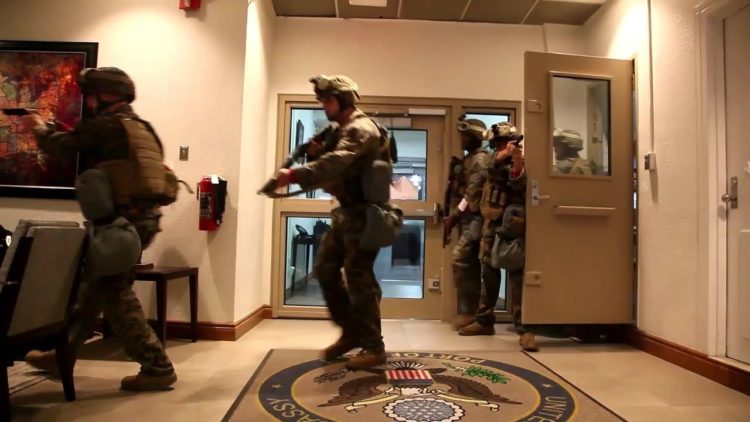Considering the current status of events in the Middle East I believe that the threat level to U.S. Embassies to be moderate to low. Embassies are fairly hard targets these days, considering the steps which have been taken to increase their security since the last major attack on a U.S. Diplomatic establishment. The last such attack was in Benghazi in 2012. It led to the deaths of four American citizens, including the ambassador to Libya J. Christopher Stevens and U.S Foreign Service Information Management Officer Sean Smith, CIA contractors Tyrone Woods and Glen Doherty and the wounding of 10 others.
U.S. Embassies have what we call in the security industry a layered defense system.
- Local authorities protect the perimeter
- Internal Security is the job of the Marine Security Guard
- Regional Security Officer (RSO)
- In some cases Assistant RSO
- Special Program for Embassy Augmented Response (SPEAR)
Teams
The first line of defense are members of the local police that protect the outer perimeter of the Embassy Compound. Depending on the location of the Compound they also might be responsible for inspecting vehicles for potential bombs. Each Embassy is given a contingent of Marines whose responsibility is the physical security of the Compound. The RSOs are special agents, in the Bureau of Diplomatic Security, charged with the coordination of security and law enforcement activities in the host country for all U.S. government agencies. SPEAR teams are local law enforcement teams specially trained in responding to emergencies at U.S. Diplomatic facilities. DSS Mobile Security Deployments include specially trained DSS agents who form special operation units used to augment security in emergency operations.
Past Embassy Attacks:
- Tehran, 1979: Embassy Seizure
- Beirut, 1983: Embassy Bombing
- Kuwait, 1984: Embassy Bombing
- Beirut, 1984: Kidnapping and murder of CIA Station Chief William F. Buckley
- Nairobi, 1998: Embassy Bombing
- Dar as Salaam, 1998: Embassy Bombing
- Benghazi, 2012: Consolate Attack killing Ambassador Chris Stevens, Sean Smith, Tyrone Woods and Glen Doherty
Qassam Soliemani was considered by some to be the number two in the Iranian Government. This could lead to the Iranians targeting an American or Israeli diplomatic official of similar stature. Steps need to be taken by both the U.S. and Israeli governments to strengthen diplomatic officials’ personal security and transportation security alert levels.
The Islamic Republic of Iran has disclosed that the missile attacks on American bases in Iraq on Wednesday were not aimed at killing any soldier. Iran had notified Iraq four hours in advance that those particular targets had been picked for retaliatory strikes. Iraq then passed on this information to the U.S intelligence and the troops were evacuated prior to the attacks being made. This allowed Iran to strike back at the U.S. and save face with both international and domestic audiences.
A senior Iranian commander, Amirali Hajizadeh, said that when the Islamic nation launched missiles on Wednesday it had used “cyberattacks to disable [U.S.] plane and drone navigation systems.”
Already have an account? Sign In
Two ways to continue to read this article.
Subscribe
$1.99
every 4 weeks
- Unlimited access to all articles
- Support independent journalism
- Ad-free reading experience
Subscribe Now
Recurring Monthly. Cancel Anytime.











COMMENTS